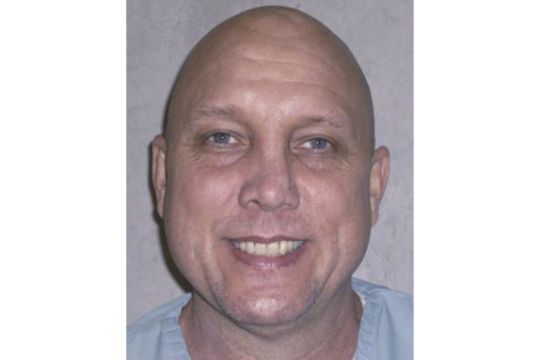A man who claimed he acted in self-defence when he shot and killed two men in 2001 has been executed in the US state of Oklahoma.
Phillip Dean Hancock, 59, received a three-drug lethal injection at the Oklahoma State Penitentiary and was declared dead at 11.29am (5.29pm GMT).
His execution went forward once Republican governor Kevin Stitt declined to commute his sentence, despite a clemency recommendation from the state’s Pardon and Parole Board.
Abraham Bonowitz, executive director of the anti-death penalty group Death Penalty Action, said: “By unnecessarily stringing out his decision-making process for weeks, he has left the families of the victims in this case, all of Phil’s advocates and loved ones, the prison workers, and Phil himself, waiting for the news.”
A spokeswoman for Mr Stitt did not immediately respond to a message seeking comment on the governor’s decision to deny clemency or why it was delayed until shortly after the execution was originally scheduled.
Hancock had long claimed he shot and killed Robert Jett Jr, 37, and James Lynch, 58, in self-defence after the two men attacked him inside Mr Jett’s home in south Oklahoma City.
His lawyers claimed at a clemency hearing this month that Mr Jett and Mr Lynch were members of outlaw motorcycle gangs and that Mr Jett lured Hancock, who was unarmed, to Mr Jett’s home.
A female witness said Mr Jett ordered Hancock to get inside a large cage before swinging a metal bar at him.
After Mr Jett and Mr Lynch attacked him, his lawyers said, Hancock managed to take Mr Jett’s pistol from him and shoot them both.
Hancock told members of the Pardon and Parole Board via a video feed from the penitentiary: “Please understand the awful situation I found myself in. I have no doubt they would have killed me. They forced me to fight for my life.”
His lawyers also have said his trial lawyers have acknowledged they were struggling with substance abuse during the case and failed to present important evidence.
But lawyers for the state argued that Hancock gave shifting accounts of what exactly happened and that his testimony did not align with physical evidence.
Assistant attorney general Joshua Lockett also cited a witness who testified that after Hancock shot Mr Jett inside the house, he followed him into the back yard.
There, the witness said, a wounded Mr Jett said: “I’m going to die.”
Hancock responded: “Yes, you are,” before shooting him again, Mr Lockett said.
“Chasing someone down, telling them you are about to kill them and then doing it is not self-defence,” Mr Lockett said.
Mr Jett’s brother, Ryan Jett, was among several family members who testified and urged the panel not to recommend clemency.
Ryan Jett said: “I don’t claim that my brother was an angel by any means, but he didn’t deserve to die in the back yard like a dog.”
Hancock also was convicted of first-degree manslaughter in a separate shooting in 1982 in which he also claimed self-defence. He served less than three years of a four-year sentence in that case.
Hancock is the fourth Oklahoma inmate to be executed this year and the 11th since Oklahoma resumed executions in October 2021 following a nearly six-year hiatus resulting from problems with lethal injections in 2014 and 2015.
Oklahoma has executed more inmates per capita than any other US state since the 1976 reinstatement of the death penalty.
The next execution scheduled in Oklahoma is James Ryder on February 1.
Ryder was sentenced to death for the 1999 killing of Daisy Hallum, 70, and to life without parole for killing her son, Sam Hallum, 38, in Pittsburg County.







